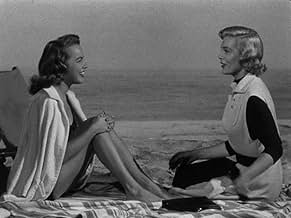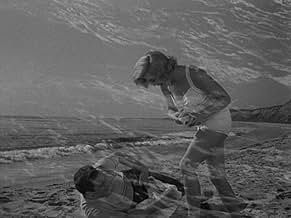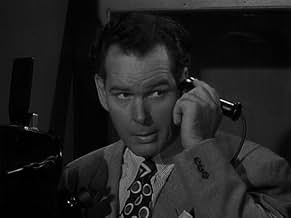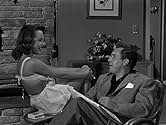CALIFICACIÓN DE IMDb
6.5/10
901
TU CALIFICACIÓN
Un abogado trama una estafa compleja para hacer pasar a un impostor como el hijo perdido de un rico industrial anciano y así reclamar su enorme herencia.Un abogado trama una estafa compleja para hacer pasar a un impostor como el hijo perdido de un rico industrial anciano y así reclamar su enorme herencia.Un abogado trama una estafa compleja para hacer pasar a un impostor como el hijo perdido de un rico industrial anciano y así reclamar su enorme herencia.
- Dirección
- Guionistas
- Elenco
Jessie Arnold
- Woman at Phone Booth
- (sin créditos)
Kathryn Card
- Bingo Woman
- (sin créditos)
Claire Carleton
- Minnie Mitt
- (sin créditos)
Louis Jean Heydt
- Chief Petty Officer
- (sin créditos)
J.M. Kerrigan
- Father Lanahan
- (sin créditos)
James Kirkwood
- Ben
- (sin créditos)
Al Murphy
- Desk Sergeant
- (sin créditos)
Emory Parnell
- First Deputy
- (sin créditos)
Blackie Whiteford
- Man at Police Station
- (sin créditos)
- Dirección
- Guionistas
- Todo el elenco y el equipo
- Producción, taquilla y más en IMDbPro
Opiniones destacadas
Edmond O'Brien, Lizabeth Scott, Alexander Knox, and Terry Moore star in "Two of a Kind" from 1951.
Brandy Kirby (Scott) and an attorney, Vincent Mailer (Knox) for a wealthy man, William McIntyre find the perfect person in Lefty Farrell (O'Brien) to pretend to be the long-lost son of McIntyre's. He will then inherit $10 million, and since McIntyre and his wife are old, there won't be long to wait until he inherits.
Brandy seduces Lefty into taking the job. In order to do it, he has to lose part of his little finger, as the McIntyre's son did. A friend of Brandy's (MooreO who is the McIntyre's niece, introduces him to them when she sees his finger and asks questions. It's looking good that Lefty will be accepted as the son and inherit a fortune.
I had a few problems with this noir. The writer tried to lighten it up with the presence and perky acting of Terry Moore, which was way out of place and came off as overdone.
Lefty is supposed to be a real charmer and a chick magnet. I'm sorry, Edmond O'Brien? Good actor but hardly oozing with sex and good looks. Under contract at that time were William Holden and Glenn Ford. I doubt many women would have turned them down.
Lizabeth Scott, one of the noir queens, looked great in her gorgeous clothes and shorter hair and, with that smoky voice of hers, was very effective. Knox really didn't have much to do. O'Brien was good as usual but for me, wrong for the part.
Without the Moore character and better casting of Lefty, the film would have been stronger. Instead, it was just passable.
Brandy Kirby (Scott) and an attorney, Vincent Mailer (Knox) for a wealthy man, William McIntyre find the perfect person in Lefty Farrell (O'Brien) to pretend to be the long-lost son of McIntyre's. He will then inherit $10 million, and since McIntyre and his wife are old, there won't be long to wait until he inherits.
Brandy seduces Lefty into taking the job. In order to do it, he has to lose part of his little finger, as the McIntyre's son did. A friend of Brandy's (MooreO who is the McIntyre's niece, introduces him to them when she sees his finger and asks questions. It's looking good that Lefty will be accepted as the son and inherit a fortune.
I had a few problems with this noir. The writer tried to lighten it up with the presence and perky acting of Terry Moore, which was way out of place and came off as overdone.
Lefty is supposed to be a real charmer and a chick magnet. I'm sorry, Edmond O'Brien? Good actor but hardly oozing with sex and good looks. Under contract at that time were William Holden and Glenn Ford. I doubt many women would have turned them down.
Lizabeth Scott, one of the noir queens, looked great in her gorgeous clothes and shorter hair and, with that smoky voice of hers, was very effective. Knox really didn't have much to do. O'Brien was good as usual but for me, wrong for the part.
Without the Moore character and better casting of Lefty, the film would have been stronger. Instead, it was just passable.
This is an uneasy blend of mystery, suspense, and comedy. I am always dubious about mixed genre films, and I believe this could and should have been better as a straight film noir. However, it is still a good film and for all like myself who admire Lizabeth Scott and enjoy watching her films, it is a must. She was most famous for playing Dusty four years earlier, opposite Humphrey Bogart, in the stunning film noir DEAD RECKONING (1947). She was one of the best femme fatale actresses in film noir, though she could also show a warm, kindly, humorous and smiling layer underneath, as we see here. That entitled her to be 'redeemed' from her wicked ways from time to time in films. It is always nice when a femme fatale can be redeemed, but it does not happen very often, in life or on film. Scott is entrancing here as usual, and is the main reason we keep watching. The male lead is Edmond O'Brien. I wonder how Scott really felt when she repeatedly flung herself (with excessive force, I felt) into O'Brien's arms and began giving him passionate kisses. She does it often here. Doth the ladye embrace too muche? O'Brien was a very fine actor, and it was Ida Lupino who seems to have realized this most enthusiastically, for she daringly cast him in the lead for her provocative film THE BIGAMIST (1953, see my review), which was a triumphant casting coup. O'Brien also won an Oscar and an Oscar nomination in other films. But he was no handsome hunk, was podgy and a bit sweaty. It all goes to show how talent can overcome lack of looks. Terry Moore plays a dotty young niece in this film, with wide-eyed insistence and a very broad interpretation. She is meant to be the comedic character, and despite the ridiculous nature of her role and the absurdity it adds to the plot, she manages it nicely. In fact, one wants to give her an indulgent hug. So it all sort of works. Henry Levin directs this mixed pudding of a film and delivers a watchable product. Oh yes, I almost forgot the story. An elderly couple lost their child at the age of three on a street in Chicago and have never found him. Their unscrupulous lawyer and his girl friend Lizabeth Scott want to 'find' a man who will play along, pretend to be the long lost son (that's O'Brien), and inherit ten million dollars which they will then all split between them. But of course things turn out not to be that simple. After O'Brien is accepted as the son, things begin to unravel. As to what then happens, I ain't sayin'.
If you like your film noir declawed and defanged, then Henry Levin's Two of a Kind is the movie for you. The vexing part is that it starts off strong, keeping the viewer off balance. Lizabeth Scott is scouring the continent looking for a particular man. Her quest takes her from a Chicago orphanage to the carny circuit to the Department of the Navy in Washington; she finally finds him, working in a bingo parlor, in Los Angeles where she started.
He's Edmond O'Brien, and she's after him because he fits the bill for a con job that she and her lover Alexander Knox have been hatching for a long time. A wealthy old couple has nobody to leave their fortune to, because their son vanished when he was only three years old. Knox, their attorney, and Scott are grooming O'Brien as a ringer to show up and claim the inheritance, which they'll all split. There are a couple of catches. For one, the kid lost the tip of his finger in a childhood accident, but since he can cash in his own fingertip for millions, O'Brien falls in with the scheme. The other is that Scott, to Knox's chagrin, starts to go sweet on O'Brien.
Up to the scene when Scott smashes O'Brien's finger in a car door, so he'll have reason to have the first two joints amputated, Two of a Kind promises to be low-down and unsentimental. But the movie's tone suffers an incapacitating fracture with the arrival of Terry Moore, as a niece of the old couple and the patsy through which O'Brien will secure his entry into the family's affections. (She's a vapid dilettante whose hobby is collecting `causes;' falling for no-good men and trying to reform them seems to be one of them.)
O'Brien gains admittance to the family; his candor about his raffish past puts him in good stead. But when the pot of gold seems just within reach, the patriarch drops a bombshell: He won't leave a cent to his newfound son on the grounds that it would ruin him. This prompts Knox to rachet up the swindle to the next level - arranging an early send-off for his unwitting benefactors. Scott and O'Brien demur, but by this time they're in too deep....
The dark tone of the opening returns briefly, but it's too late and doesn't last. Despite that brutal finger-smashing, there's a squeamishness to the movie that doesn't let it pursue the expectations it raises. The insipid ending opens regretful speculation: Whatever happened to the Lizabeth Scott of Too Late For Tears, the Edmond O'Brien of 711 Ocean Drive, and the Henry Levin who directed Night Editor?
He's Edmond O'Brien, and she's after him because he fits the bill for a con job that she and her lover Alexander Knox have been hatching for a long time. A wealthy old couple has nobody to leave their fortune to, because their son vanished when he was only three years old. Knox, their attorney, and Scott are grooming O'Brien as a ringer to show up and claim the inheritance, which they'll all split. There are a couple of catches. For one, the kid lost the tip of his finger in a childhood accident, but since he can cash in his own fingertip for millions, O'Brien falls in with the scheme. The other is that Scott, to Knox's chagrin, starts to go sweet on O'Brien.
Up to the scene when Scott smashes O'Brien's finger in a car door, so he'll have reason to have the first two joints amputated, Two of a Kind promises to be low-down and unsentimental. But the movie's tone suffers an incapacitating fracture with the arrival of Terry Moore, as a niece of the old couple and the patsy through which O'Brien will secure his entry into the family's affections. (She's a vapid dilettante whose hobby is collecting `causes;' falling for no-good men and trying to reform them seems to be one of them.)
O'Brien gains admittance to the family; his candor about his raffish past puts him in good stead. But when the pot of gold seems just within reach, the patriarch drops a bombshell: He won't leave a cent to his newfound son on the grounds that it would ruin him. This prompts Knox to rachet up the swindle to the next level - arranging an early send-off for his unwitting benefactors. Scott and O'Brien demur, but by this time they're in too deep....
The dark tone of the opening returns briefly, but it's too late and doesn't last. Despite that brutal finger-smashing, there's a squeamishness to the movie that doesn't let it pursue the expectations it raises. The insipid ending opens regretful speculation: Whatever happened to the Lizabeth Scott of Too Late For Tears, the Edmond O'Brien of 711 Ocean Drive, and the Henry Levin who directed Night Editor?
It Seems that the Sharp, Dark, Rough World of Film-Noir was just too Much for the Newly Emerging Conservative 1950's.
The Forces that be were Out to Tame Film-Noir and Morph the Style into Police Procedurals, and Other Easily Digested Movies "Sweetening" the "Sour".
Case-in-Point, "Two of a Kind", this one had All the Signs of the Genre .
But were Proven a Slight-of-Hand, sort of, or a Mis-Direction.
Starring Noir Icon's Edmond O'Brien and Lizabeth Scott and a Poster that Shows Not a Hint that it will Take a "Detour" to Comedy, and a Light-Hearted Approach as the Con-Game is Played-Out.
When Terry Moore's "Screwy" Character Shows-Up, it No-Longer even Tries to Maintain its Bona-Fides as a Film-Noir.
It has One Extremely Disturbing Scene, "The Car-Door", but the Rest of the Story is so Breezy and Aloof as to be Distracting to Anyone who was Expecting a More Serious, Gritty Story.
Overall, it can be Enjoyed as a Light-Crime Con-Game with Good Actors and Good Cinematography.
The Genre of Film-Noir, to This Day, is Exploited and the Label is Slapped on Movies that Just Don't Cut-It. The True Essence and Meaning of the Descriptive has been Lost Almost Completely.
This Whole Thing Started Around 1950-51 and is Still Around Today.
For Film-Noir Purist, be Prepared for a Let-Down.
The Forces that be were Out to Tame Film-Noir and Morph the Style into Police Procedurals, and Other Easily Digested Movies "Sweetening" the "Sour".
Case-in-Point, "Two of a Kind", this one had All the Signs of the Genre .
But were Proven a Slight-of-Hand, sort of, or a Mis-Direction.
Starring Noir Icon's Edmond O'Brien and Lizabeth Scott and a Poster that Shows Not a Hint that it will Take a "Detour" to Comedy, and a Light-Hearted Approach as the Con-Game is Played-Out.
When Terry Moore's "Screwy" Character Shows-Up, it No-Longer even Tries to Maintain its Bona-Fides as a Film-Noir.
It has One Extremely Disturbing Scene, "The Car-Door", but the Rest of the Story is so Breezy and Aloof as to be Distracting to Anyone who was Expecting a More Serious, Gritty Story.
Overall, it can be Enjoyed as a Light-Crime Con-Game with Good Actors and Good Cinematography.
The Genre of Film-Noir, to This Day, is Exploited and the Label is Slapped on Movies that Just Don't Cut-It. The True Essence and Meaning of the Descriptive has been Lost Almost Completely.
This Whole Thing Started Around 1950-51 and is Still Around Today.
For Film-Noir Purist, be Prepared for a Let-Down.
It's a nifty premise that fails to fulfill an early promise. Seductress Brandy (Scott) lures wiseguy Lefty (O'Brien) into a million-dollar fraud scheme. All it will cost him is time in a swanky beach house and half a finger. But that's okay because he'll still have nine and a-half left, plus a big inheritance from a wealthy old couple. Then too, if he gets cold feet, slinky Brandy is always there to warm him up. Mastermind Vincent (Knox) has hatched what looks like a sure thing.
However, I'm with reviewer bmacy. After that promising start, especially with the slamming car door, the movie takes an irretrievable tumble. And that's when Terry Moore's loopy overacting hits the scene. Catch that night time set-up where Lefty breaks into Kathy's (Moore) place and she squeals with delight over what appears a potential rapist or killer. Sorry, but that's about as poorly written and ill conceived a scene as I've witnessed in some time. And who was it who decided to insert Lefty's face-making as comedic accompaniment to Kathy's description of him. It's not only unnecessary, but unsubtly attacks the whole surrounding mood. As bmacy points out, by the time the movie recovers from such ruptures, it's already too late.
At the same time, director Levin appears to have little feel for the material, his career being mainly in light comedies. As a result, the story simply unfolds in pedestrian fashion without any distinguishing touches or development. As a result, and despite its two noir icons, the 80-minutes comes across as more disappointing than gritty crime drama.
However, I'm with reviewer bmacy. After that promising start, especially with the slamming car door, the movie takes an irretrievable tumble. And that's when Terry Moore's loopy overacting hits the scene. Catch that night time set-up where Lefty breaks into Kathy's (Moore) place and she squeals with delight over what appears a potential rapist or killer. Sorry, but that's about as poorly written and ill conceived a scene as I've witnessed in some time. And who was it who decided to insert Lefty's face-making as comedic accompaniment to Kathy's description of him. It's not only unnecessary, but unsubtly attacks the whole surrounding mood. As bmacy points out, by the time the movie recovers from such ruptures, it's already too late.
At the same time, director Levin appears to have little feel for the material, his career being mainly in light comedies. As a result, the story simply unfolds in pedestrian fashion without any distinguishing touches or development. As a result, and despite its two noir icons, the 80-minutes comes across as more disappointing than gritty crime drama.
¿Sabías que…?
- TriviaThe plot bears a resemblance to that of the 1945 noir "Detour," where a drifter, with the insistence of a scheming female, attempts to inherit the fortune of a recently deceased man by assuming the identity of the man's long-lost son.
- Citas
Michael "Lefty" Farrell: But first, I used to slip away from Daddy and run, kiss Mommy goodnight, like this.
[plants a big kiss on Brandy]
- ConexionesReferenced in Dynastía: Trashy Little Tramp (2018)
Selecciones populares
Inicia sesión para calificar y agrega a la lista de videos para obtener recomendaciones personalizadas
- How long is Two of a Kind?Con tecnología de Alexa
Detalles
- Tiempo de ejecución1 hora 15 minutos
- Color
- Relación de aspecto
- 1.37 : 1
Contribuir a esta página
Sugiere una edición o agrega el contenido que falta

Principales brechas de datos
By what name was El hijo perdido (1951) officially released in India in English?
Responda

































